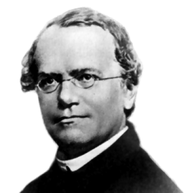What Does the Future of Energy Look Like?
It’s the birthday of Gregor Mendel, whose famous experiments with pea plants in 1854 led to his theory of genetics. But, according to The Writer’s Almanac, when Mendel died in 1888, his papers were burned, and it wasn’t until the 1920s that scientists recognized the significance of Mendel’s work.
That certainly makes one wonder about the ideas we may have floating around us today, doesn’t it? As I’m fond of saying, if we still have a civilization here in a few decades, we will have conquered this energy problem; I’m quite certain that we will not be burning coal in 2050. There are, however, many open questions, among which are:
• Exactly what technologies will scale to win the day?
• Who will make a buck in the process?
• How much ecological damage will we have done by that time?


The winner appears to be NG and LNG; the loser is coal. Chemical companies are likely to make a buck on NG by adding value. Ecological damage will be dominated by the effects of coal burning in China.
Probably even after 2050 there will still be come coal and wood burning, but probably it will no longer be a major source of energy for generating electricity.
Regardless of how much global warming occurs, humanity will survive. However, at least in certain areas of the world, civilization as we understand it, could be destroyed.
The burning of Mendel’s papers reminds me of the archiving and ignoring of the papers written by Weinberg on the liquid fluoride thorium reactor (LFTR). Because of the political influence of Admiral Hyman Rickover, the LFTR funding was dropped and the pressurized water uranium reactor became almost the exclusive type of reactor used for commercial power. We are still paying a high price for that mistake. This information comes from the book “Super Fuel….” by Richard Martin; I regard it as a “must read” book for anyone concerned with the development of energy systems.
Highly speculative. Here goes.
Projections I’ve seen on atmospheric CO2 say that we will get to the mid 400’s (ppm) even if we do a 90% cut in existing CO2 starting right now. Apparently, the warming effect is non-linear and certainly not homogeneous at the planetary level. We see that already.
How many degrees C does it take to trigger an exponential increase in the bound methane hydrates? I haven’t seen anything on that. Wherever that is, its a true tipping point. When the methane becomes significant, we will go highly non-linear.
Guesstimates on ocean levels are always done absent a Greenland and Antarctica melt. If those go, its apparently a minimum of 7 meters. Being a California person, one of the things I’ve wondered about is the SF Bay area. Certainly there are shoreline issues just like Florida and other maps we’ve seen, but the interesting component is the San Joaquin valley as seen from the Bay. A very small increase of ocean level will result in the entire inland portion of central California being inundated. For those that don’t know this, a portion of that section of the valley is slightly below sea level. That is one of the important food growing areas for the entire USA. There is no good way to dam it up and prevent that incursion. The picture of the state will change significantly as a result. We have already been dealing with salt water incursion issues.
I’m guessing Craig is right about the coal, although I wouldn’t hazard that opinion for the entire planet – just some of the more developed countries.
Ecological damage is probably the most complex portion of the topic. Will we continue to lose a large number of species for a variety of reasons? Seems like a safe bet. Will deforestation significantly increase beyond its present state? Also a safe bet. This will contribute to accelerating the atmospheric CO2.
Until humans get over their strange religious thoughts or biological urges in procreation, we are going to create an increasingly large portion of the population who’s only destiny is to die of disease or starvation or warfare. There is a likely significant increase in all three categories.
Absolute quantities of arable land and potable water at the planetary level will continue to decrease. This helps to accelerate the processes in prior paragraph.
We will continue to increase the conflation of knowledge with opinion and belief, and this will result in the constant increase in ‘magical thinking’. Hope is a wonderful emotion that I heartily endorse, but it doesn’t grow corn.
In conclusion, I firmly believe that we as a race will go on. Humans are adaptable in their own way almost as much as roaches. What it will look like however, is probably some combination of the more amazing dystopic futures put forth by our creative writing community.